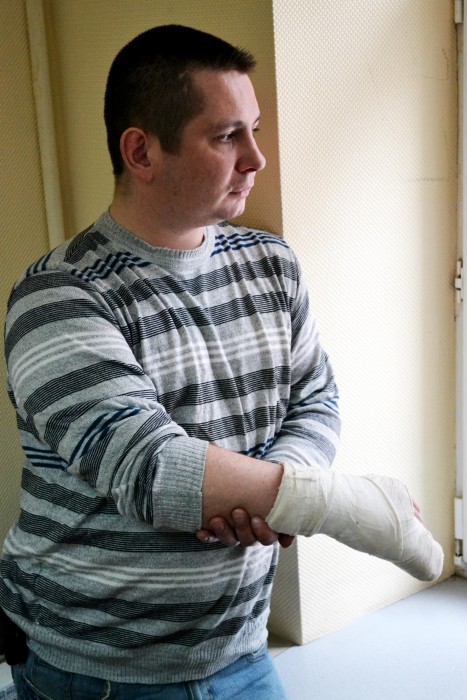On April 9, 2012 the Committee Against Torture received an application from Nizhny Novgorod resident Maxim Karpayev. He alleged that he had had his arm broken by the police.

On April 1, 2012 Maxim Karpayev was detained on suspicion of theft. He was taken to police department no.7 in the Sovietsky district of Nizhny Novgorod.
According to Maxim, the duty officer took him to an interrogation room. The applicant refused to answer any questions. Then the duty officer and a police sergeant who was also in the room at the moment attacked him. The sergeant twisted the applicant’s left arm and beat him down. The lieutenant senior stepped on his right arm stretched forward as a result of falling. The police started tearing Maxim’s clothes off, damaged his jeans and shirt, stripped him to his underwear, handcuffed and dragged him to a cell.
The applicant found himself on the concrete floor. It was cold, his arm got swollen and hurt badly. He started knocking on the door asking for his clothes and a medical examination. The duty officer got annoyed with the restless detainee and, apparently, decided to calm him down. He came up to the door and sprayed OC gas into the detainee’s face through the bars. Maxim screamed of pain and started calling for help. In an hour the police called in an ambulance. Emergency doctors examined the applicant and said that he should be urgently hospitalized for rinsing his eyes and making an X-ray of his arm. The doctors were revolted from the fact that the detainee was not dressed. However, the duty officer did not allow taking Maxim to hospital.
In 2 hours Maxim called the duty officer again and showed him his arm which was swollen to a double size, he also asked for clothes. The lieutenant told him: “You write a confession, we give you the clothes back”. Maxim agreed to sign everything and received his clothes back as a reward.
Only the following day Karpayev was granted medical assistance. He had his bone on the right arm reset and plastered.
As soon as Maxim recovered from the injury, he applied to the Russian Investigative Committee.
We are struck by the disproportionate cruelty of policemen who try to obtain a confession at whatever cost. From the moment a confession has become the queen of evidence, the police obtains it not stinting on beatings. Even in a simple case with abundant evidence it is considered necessary to obtain a written confession.
The actions of the duty officer who has prevented provision of medical assistance to the detainee are not consistent with the portrait of an ideal policeman and stain it with antihumanism. When will the image of the police become human in the eyes of the public?